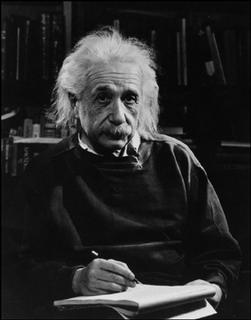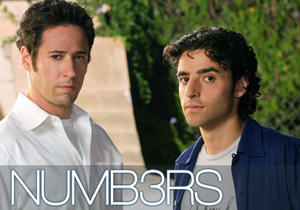Einstein, Numb3rs, and Entertainment


Sometimes a juxtaposition of contrasts sets me to thinking. Today it’s about the challenge of reconciling or balancing realism with idealism. Three things started my train of thought. First, I received some new comments to my blog from my former high school friend who turned Libertarian — and tough minded, to judge from the tone of his remarks. In one comment he was demanding more respect for George W. Bush and explaining why it had been appropriate to use the atomic bomb on Hiroshima and Nagasaki. In another he was passing along the complaints of someone who had distributed aid in New Orleans to rude blacks who had shown no appreciation for his generosity. Ted had called himself a believer in “realpolitik,” and that seems a fair summation, for he doesn’t seem to bring ideals into his political and social commentaries. (A week later, Ted has learned that the racist story about New Orleans blacks was a hoax and has apologized for forwarding it to me. Thanks, Ted.)
The second element in my conundrum was last night’s season premiere of the CBS television show Numb3rs, starring Rob Morrow as an FBI agent. I watched it last year mostly out of loyalty to Rob, whom I know and like. In person he’s a thoughtful, socially conscious guy whose spiritual concerns are readily accessible in conversations. As an actor, he’s particularly good at playing expressive, spontaneous characters. He thrives on improvisation, and when he’s allowed the leeway to do that, he never plays a scene the same way twice. But Numb3rs is a fast-paced, violent thriller. Rob’s character, Don Eppes, is a rigid cop devoid of emotions or, apparently, much of an inner self at all. His job is simply to catch lawbreakers and lock them up — or kill them, if need be. If he uses his gun, he never gives it a second thought later. Don is one tough, realistic hombre who doesn’t look for a better world than the mean one he inhabits. You may respect him (for he has integrity, courage, and smarts) but you can’t love him, for love is a response to another’s feelings.
Numb3rs regularly disappoints me and, unfortunately, it may be getting more violent and less intellectually interesting this season. It did have a three-dimensional quality last year that involved Don’s younger brother Charlie, a sweet but socially inept mathematics professor who developed equations that plausibly solved each crime. But the math has degenerated. Now instead of demonstrating his reasoning at the blackboard, Charlie merely announces inexplicably that his calculations point to so-and-so as linked to the crime. We must take on faith inferences that, last year, would have been demonstrated.
But the fake math is not what bothers me most. It’s the meaninglessness of such shows, which lack interpersonal, emotional, or spiritual dimensions. Indeed, I doubt that even Steven Johnson could praise this one, though he famously maintains that complex plots, by making us think fast, actually make us smarter. Numb3rs moved so fast that no one could follow the FBI agents’ reasoning. There must have been six or eight suspects, each one of whom was replaced sequentially by the next, without explanation or even hints.
Regrettably, no one developed as a result of the experience. These characters, so oriented toward “reality,” do not permit themselves to reflect on the possibility that the world might be improved. There is no better example than this series to reveal the limitations of today’s television drama. Storytelling must improve if we are to create a culture that supports human well-being and inspires viewers to become activists. The characters must have — or at least seek — meaning in their lives.
But today I’ve been reading Einstein. He never wrote a book about his world view, but many of his short articles and letters were published, offering an amazing contrast to Ted the tough-minded Libertarian and Don the unemotional FBI agent. Whereas you can’t love Don, you can’t help loving Einstein. Einstein was an idealist, through and through. At the same time, he was devoted to the realistic search for truth about the workings of the universe. The hard work of scientific research was a response, he said, to the spiritual sense of cosmic wonder. He wrote, “The fairest thing we can experience is the mysterious. It is the fundamental emotion which stands at the cradle of true art and true science.”
Einstein’s reflections — even about physics — inspire and move the reader, and especially touch us when he writes about God and the meaning of life. To him, religion and science were not separate domains, nor was idealism antithetical to realism.
In our own everyday experience, however, it is often difficult to reconcile reality with ideals. The simplest solution is to choose the one and repress the other. Thus we can recognize among our acquaintances some who are realists and others who are idealists. Such one-sidedness distorts. If you pay attention only to circumstances and conditions, you notice what is but not what ought to be or even what you might hope for. Thus you explain the bombing of Hiroshima or a cop’s shooting of a criminal as a “realistic necessity,” and you feel neither remorse nor pity. If, on the other hand, you pay attention only to visionary purposes and the larger meanings of situations, you may not notice intractable circumstances. You may inhabit an imaginary world, ignoring facts and coping poorly.
Realism and idealism are both necessary. We cannot properly choose one to the exclusion of the other, nor can we always reconcile them. The tension between them is ineluctably part of the human condition. That makes life painful. It also makes life fun.



3 Comments:
realism vs idealism
I know that the state of the world today has left many people very jaded & cynical about political activism, leaving only the most fervent hippies still clinging to idealist dreams that "another world is possible." I've always been too much of a pessimist, I suppose, to really believe that the "revolution's a'coming", and thus have been floundering for a position that combines this pessimistic streak with an objective, concerned global view and a strong sense of ethics.
To this end, on my commute you can find me reading "The Best Democracy Money Can Buy," Greg Palast's collection of corporate scandal exposed (basically, "free trade & capitalism are evil") or The Economist's "Capitalism and Democracy" issue last week (basically, "free trade & capitalism are wonderful, except for cronyism, which is a problem, but free trade is still the best thing since sliced bread").
This month's Mother Jones features an article helping to refine this view, that of the "realist activist." The cover article, is by the author of "A Bed for the Night: Humanitarianism in Crisis" which has been on my "to-read" list for a year now.
So check it out: Goodbye, New World Order (free).
http://www.motherjones.com/news/feature/2003/07/ma_442_01.html
I haven't got round to reading the article you recommended in Mother Jones. However, I got acquainted last summer with David Rieff, who came to the Pearson Peacekeeping Centre in Nova Scotia to give a talk about the problems facing humanitarian workers. He was so pessimistic that everyone there seemed to reject his ideas.
Unfortunately, Numb3rs doesn't have any longetivity to it, as math is not truly used to solve many crimes. Math is primarily used in geogrpahic profiling (which was pioneered in Canada, IMO). Alot of the math explanation makes some sense, but it's difficult to have 25 unique episodes per season based on different math issues. While Rob Morrow and Judd Hirsch are great actors, the surrounding characters are not.
I don't know about you, but I can't really define what reality even is. I go through my day, listen to the news (American) knowing that most of the stories are fully oversimplified and biased somewhat. American radio and television are so polarized these days that it's difficult to get accurate information. Even Canadian television and radio seems to drift a little bit too far to the left for me.
Even in my day to day life, I realize that most of my thoughts are based on my version of reality, and that while I may be based in the real world, my thoughts are just that: unreal.
Post a Comment
<< Home